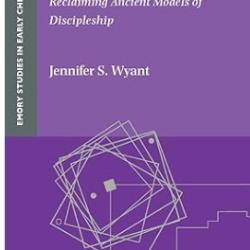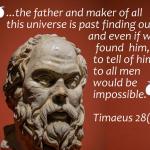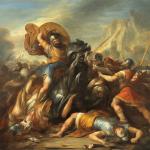Historical Errors in Pagan Christianity
My previous article was “Is the Sunday Morning Preaching Sermon Inherently Pagan?”
In that article I showed how several leaders in primitive Christianity were highly educated. This includes the apostle Paul and Apollos, both of who were formally educated before becoming Christians. It is likely that Apollos was trained in the great philosophical school of Alexandria – he was certainly trained in philosophy. The previous article was focused on Viola’s ignorant statements about using rhetoric in sermons.
the Christian education system is
“built on the Platonic idea that knowledge is the equivalent of moral character.” (p.215)
This is just one more ignorant statement Viola makes as he claims that the apostolic age was marvelous…and the modern church is mostly lost in paganism. Thus the title of his book. [-1-]
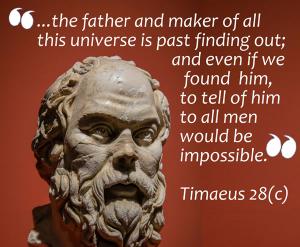 Photo by Mustafa Kalkan | Pexels.com – bust-of-socrates-22487126/ – text added by Al Baker
Photo by Mustafa Kalkan | Pexels.com – bust-of-socrates-22487126/ – text added by Al BakerIn this section I will argue against his statement above that Christian education is based on pagan philosophy.
I have my own criticisms of our seminary systems, but I think once again Viola is just throwing bombs. My initial reaction? I know several men and women who serve as professors in seminaries. They do not equate knowledge with spiritual character.
My second thought is that Socrates/Plato did not think this either! But would Viola know this? I seriously doubt it. Has he ever read Plato? Again, doubtful.
I am NOT a philosophy scholar.
I have read Plato’s Republic and several key passages from 4-5 of his other works. Around 20% of my Ph.D. bibliography focused on aspects of Platonic philosophy in the second century.
I do not claim to be an expert in this field. However, I know enough about Plato to know that Viola’s comment equating knowledge and moral character is quite simply ignorant and misleading.
I use the word ignorant quite purposefully. This is not meant as ad hominem. This is not the same as calling Viola a jerk or a self-absorbed, worthless soul. I mean the actual definition of ignorant:
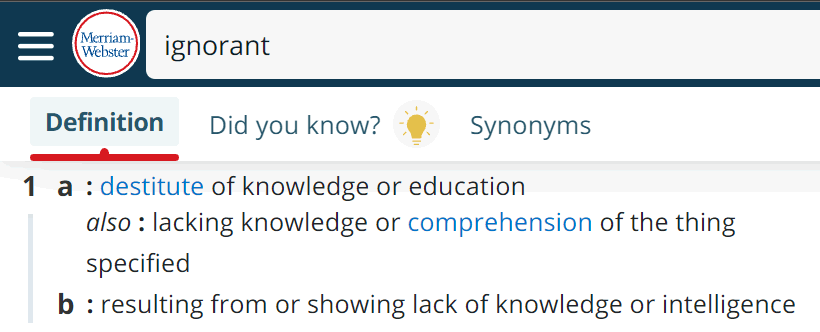
Classical Education is NOT “Pagan”
In the famous Allegory of the Cave in the Republic we get a simple summary from Plato on knowledge:
…it appears to me that in the region of the known [knowledge] the last thing to be seen…is the idea of good…indeed the cause for all things, of all that is right and beautiful…the author of light…and that anyone who is to act wisely in private or public must have caught sight of this. Republic VII.517B-C
Plato believed that gaining knowledge is supposed to move you closer to God so you will “act wisely.” Gaining knowledge is not the end goal, but is supposed to be the path to get you there.
For Socrates/Plato the pursuit of “The Good” [God] is THE goal of the philosopher. “The world of knowledge” is supposed to lead to “the idea of good.” Socrates was executed for teaching his students that there was one God, “the Maker and Father of this Universe.” Timaeus 28(c). [-3-]
Viola Either does not Know How to do Research…OR
Viola cites a study on Faith Communities Today by Hartford Seminary. He argues that seminaries are failing. He uses this study to support his conclusion that seminary graduates are not good pastors:
“The major finding of the study” was that congregations with seminary trained leaders experience more problems, one of these being “more and different kinds of conflict.” [-2-]
Viola fails to accurately represent his sources (and I had doubts about his statement), so I decided to read the study. The document is 71 pages (there are a lot of graphs which makes the volume of reading far less) with six different sections: two come into play with Viola’s comments: one on “Growth, Change and Conflict” and the final section on “Leadership.”
Viola Cherry-Picked this Study
Viola’s statements linking education and the lack of conflict skills is the only observation he gleans from the 71 page study. The study does give the education/conflict correlation, but there are other factors in the study NOT mentioned by Viola.
Seminary leaders represent 61% of the pastors in the study and those pastors are leading the largest churches, averaging 200-260 people. It just happens that churches founded more than 50 years ago tend to have the most difficulty dealing with conflict AND the most difficulty having clear vision. (FACT-2000, pp.60,62)
These types of churches tend to be larger and more established, thus these churches are more likely to have seminary educated pastors. (FACT-2000, p.64)
On Page 67 (where Viola gathered the data for his citation) there are at least four qualifying statements: “To appropriately understand these responses”…”It is possible”…”Or it may be”…and “More and careful study is needed.”
A Multi-Variant Problem
My opinion after a close look at this study is that conflict management in church is a
multi-variant problem – Viola is only focused on seminary education. He either does not know how to parse data that are multi-variant OR he simply cannot be trusted to present data objectively.
His treatment of the FACT-2000 study is like telling a friend that your college football team lost their game at a rival’s stadium because the refs were paid off. Then your friend watches the replay of the game and sees that your team had three penalties late in the game for being “off-sides.” The rival fans were so loud the linemen could not hear the quarterback. Also, the best running back on your team was injured in the fourth quarter, then your team missed two fairly close field goal attempts…in the fourth quarter.
The refs may have been paid, but there were certainly other factors that could explain the loss. (I hate it when fans blame the refs because they just cannot bring themselves to be objective.) For me, that is what it feels like to read Viola.
Viola’s use of this FACT-2000 study might be the best thing about this section of his book.
I doubt very many people took the time to look at the study, fewer still would read all 71 pages…but it certainly feels like he did his research!
My Personal [not scholarly] Opinions
I grew up in a mainline denominational “high” church environment, but did not become a Christian until I was 17 yrs old. I have now been a Christian for 48 years (see my bio for details). Almost all of the highlights in my spiritual life have happened outside the formal “church” environment. To use Viola’s jargon, my church preference is “organic.” Small groups and house groups has been some of the main sources of spiritual input into my life.
In essence, I agree with many of the concepts Viola presents – he has many good points to make. What pushed me to focus my attention on this book were the numerous historical errors Viola makes in his book. He could have written a solid critique of our modern church without throwing bombs. And, he should stay away from trying to be scholarly – he fails miserably when he tries to wade into the historical waters.
Viola is in the home church movement. Fine. Good.
I have been in 2-3 really good house fellowships over my 48 years of being a follower of Jesus. But I also personally know of three home church fellowships that went off track. One has embraced something like the “Hebraic Roots” movement, so they “joyfully” live under the “Old” covenant. They now see Jesus as Messiah, but not as deity. I know of a home church that was seemingly good for everyone and contributed to their growth, but they sat under the teachings of only one man (which Viola seems to affirm). The spiritual diet of this group was unbalanced. The man they followed is not in error, but is not balanced (in my opinion). A third group seemed to be very good for a close friend of mine, but again, the teaching was not balanced, leaning towards being “super-spiritual” all the time.
Even though this book contains many valid criticisms…I cannot recommend it to anyone. I think this book could be dangerous to young Christians (like I was in my early 20’s) who do not have enough knowledge of the New Testament or enough life experience to know when they are being led by rhetoric, a lack of integrity, or just plain ignorance.
Young men with attitude and immaturity can easily be led to walk away from a good church seeking the perfect church…and take their arrogance and stubbornness (like a virus) into a new church body.
NOTES:
- Viola, Frank and George Barna, Pagan Christianity (Tyndale House Publishers 2012), p.215.
- Viola, pp.216-217. Dudley, Carl S. and Roozen, David A., “Faith Communities Today: A Report on Religion in the United States Today,” Hartford Seminary (2001), p.67. References to this report will be to “FACT-2000” and will be given in the body of this article. [https://faithcommunitiestoday.org/wp-content/uploads/2019/01/FACT-2000-Report.pdf]
- I realize that this statement is made by Timaeus in the dialogue, yet Socrates responds with, “Excellent, Timaeus.” From the entire discourse it is clear that Socrates (Plato) agree with this statement about the creator.
 Al Baker has served 20+ years as a pastor (university pastor and local church), was an adjunct then an associate professor of Philosophy and Religion at Saint Augustine’s University in Raleigh NC for six years.
Al Baker has served 20+ years as a pastor (university pastor and local church), was an adjunct then an associate professor of Philosophy and Religion at Saint Augustine’s University in Raleigh NC for six years.
After serving as the university pastor of Chi Alpha (Assemblies of God) at the University of Alabama for 11 years, he moved his family to St Andrews, Scotland. In 2001 Al Baker completed his Ph.D. in Early Church History at the University of St Andrews.
In 2005 he started churchhistory101.com, surpassing 1 million unique visitors in 2016. On that site there are several articles on different aspects of early Christianity and two PDF eBooks you can download.






